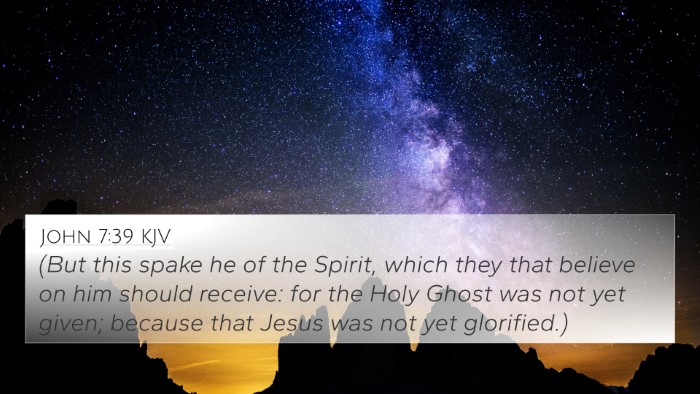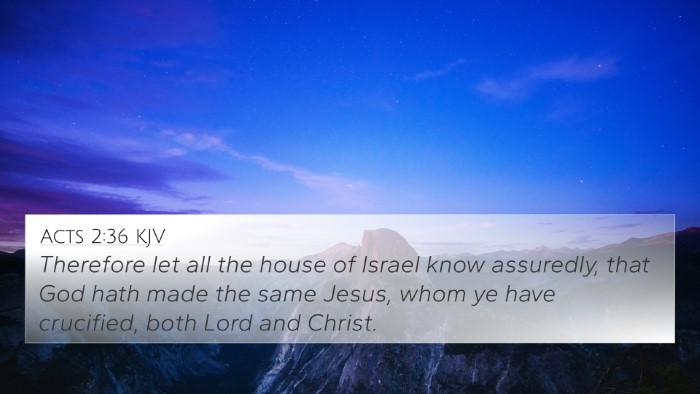Understanding John 13:31
John 13:31 presents a pivotal moment in the New Testament, symbolizing a transition in Jesus' ministry and the establishment of a new commandment that underscores His mission. The verse states:
“When he had gone out, Jesus said, ‘Now is the Son of Man glorified, and God is glorified in him.’”
Verse Context and Insights
According to Matthew Henry's Commentary, this verse follows the departure of Judas Iscariot, which marks the beginning of a series of teachings directed towards the loyal disciples. Henry indicates that the glory of God will soon be revealed through Jesus' impending sacrifice, tying this to the theme of sacrificial love.
Albert Barnes expands on this, emphasizing the idea of glorification. When Jesus mentions His glorification, it reflects the culmination of His mission through the impending crucifixion, which ultimately reveals God’s majesty and love for humanity.
Adam Clarke adds that this glorification involves both a temporal and spiritual component, highlighting how the events soon to unfold (Jesus' death and resurrection) will reveal God's character and purpose.
Thematic Connection and Cross-References
The connections between Bible verses play a crucial role in deeper understanding. John 13:31 resonates with several other scriptures that reveal overarching themes of glory, love, and sacrifice. Here are some notable cross-references:
- John 12:23-28 - Jesus speaks of His hour of glory coinciding with His death.
- Matthew 26:30-32 - The prediction of Peter’s denial follows the Last Supper where Jesus is glorified.
- Romans 8:18 - The suffering of the present time is not worthy to be compared with the glory that will be revealed.
- John 7:39 - The Spirit was not yet given because Jesus was not yet glorified.
- Philippians 2:9-11 - God highly exalted Jesus and bestowed on Him the name above all names.
- 1 Peter 1:11 - The prophets investigated the suffering and the subsequent glories of Christ.
- Colossians 1:27 - The hope of glory resides in believers through Christ.
- Luke 9:26 - Jesus speaks of being ashamed of those who are ashamed of Him, highlighting the glory of the Son.
- Revelation 21:23 - The glory of God will illuminate the New Jerusalem.
- Hebrews 2:10 - Jesus is made perfect through suffering, bringing many sons to glory.
The Importance of Glorification in Jesus' Ministry
Glorification in John 13:31 serves as a fulcrum for understanding the Gospel's narrative. It indicates that through His death and resurrection, Jesus enacts a transformative event for humanity. Matthew Henry elaborates that this moment marks the beginning of the fulfillment of God's redemptive plan.
Applications and Implications
This verse pushes believers to reflect upon the necessity of suffering in the Christian walk, paralleling the experience of Christ with their own. As Albert Barnes notes, the Christian life may entail trials, but through them, believers are invited to participate in the glory of Christ.
Summary of Insights
Thus, John 13:31 encapsulates a profound truth regarding the relationship between glory and suffering. It invites a comparative Bible verse analysis through its connections with various passages that echo the themes of sacrifice, love, and divine glorification. With this verse as a focal point, believers are encouraged to engage in cross-referencing Biblical texts, exploring links between Scripture to deepen their faith.
Practical Cross-Referencing Tools
For those interested in delving deeper, utilizing Bible concordance or a Bible cross-reference guide can significantly enhance study. Engaging in methods such as cross-reference Bible study can unveil the intricate tapestry of biblical themes.
Conclusion
Through John 13:31, believers are reminded of the interconnectedness of biblical truths and the importance of recognizing Jesus' glorification as a central tenet of the Christian faith. As connections between Bible verses unfold, one can appreciate the richness of God's Word and its applicability to daily life.


























